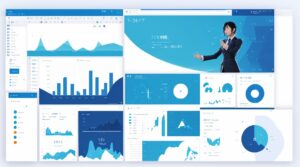# Revolutionary AI Automation Tools Transforming Business in 2024
The landscape of business automation has undergone a dramatic transformation with the advent of advanced AI technologies. In 2024, we’re witnessing an unprecedented integration of artificial intelligence into everyday business processes, fundamentally changing how organizations operate and compete.
## The Rise of Intelligent Automation
Traditional automation focused on repetitive, rule-based tasks. Today’s AI-powered automation tools bring cognitive capabilities that can understand context, learn from patterns, and make intelligent decisions. This shift represents not just an incremental improvement but a paradigm change in how businesses approach efficiency and innovation.
### Key Benefits of AI Automation
1. **Enhanced Decision Making**: AI systems analyze vast amounts of data in real-time, providing insights that human analysts might miss.
2. **Predictive Capabilities**: Machine learning algorithms can forecast trends and potential issues before they occur.
3. **Natural Language Processing**: Modern tools can understand and process human language, making them accessible to non-technical users.
4. **Adaptive Learning**: These systems improve over time, becoming more accurate and efficient with use.
## Top AI Automation Tools in 2024
### 1. Intelligent Process Automation (IPA) Platforms
Leading platforms like UiPath and Automation Anywhere have evolved beyond simple RPA to include AI capabilities. These tools now feature:
– Computer vision for processing unstructured data
– Natural language understanding for email and document processing
– Machine learning models for decision automation
### 2. AI-Powered Customer Service Solutions
Customer service has been revolutionized by AI chatbots and virtual assistants that can:
– Handle complex queries without human intervention
– Provide 24/7 support across multiple channels
– Learn from interactions to improve response quality
– Seamlessly escalate to human agents when necessary
### 3. Predictive Analytics and Business Intelligence
Tools like DataRobot and H2O.ai are democratizing advanced analytics:
– Automated machine learning (AutoML) for non-data scientists
– Real-time dashboards with predictive insights
– Anomaly detection for fraud prevention and quality control
– Scenario planning and what-if analysis
## Implementation Strategies
Successfully implementing AI automation requires careful planning and execution:
### 1. Start with Clear Objectives
Define specific, measurable goals for your automation initiatives. Whether it’s reducing processing time, improving accuracy, or enhancing customer satisfaction, clear objectives guide tool selection and implementation.
### 2. Assess Your Data Readiness
AI tools require quality data to function effectively. Evaluate your data infrastructure, quality, and governance practices before implementation.
### 3. Choose the Right Tools
Consider factors such as:
– Integration capabilities with existing systems
– Scalability for future growth
– User-friendliness for your team
– Total cost of ownership including training and maintenance
### 4. Plan for Change Management
Successful automation requires buy-in from all stakeholders. Develop a comprehensive change management strategy that includes:
– Clear communication about the benefits and impacts
– Training programs for affected employees
– Gradual rollout with pilot programs
– Continuous feedback and improvement loops
## The Future of AI Automation
As we look ahead, several trends are shaping the future of AI automation:
### Autonomous AI Agents
Next-generation AI agents will operate with minimal human oversight, managing entire business processes end-to-end. These agents will collaborate with each other, forming networks of specialized AI systems.
### Edge AI and IoT Integration
AI processing is moving closer to data sources, enabling real-time automation in manufacturing, logistics, and smart city applications.
### Ethical AI and Explainability
As AI systems make more critical decisions, the demand for transparent, explainable AI is growing. Future tools will need to provide clear reasoning for their actions and decisions.
### Quantum-AI Hybrid Systems
The convergence of quantum computing and AI promises to solve previously intractable problems, opening new possibilities for optimization and pattern recognition.
## Conclusion
AI automation tools are no longer a luxury but a necessity for businesses seeking to remain competitive in 2024 and beyond. The key to success lies in thoughtful implementation, continuous learning, and a willingness to adapt as technology evolves. Organizations that embrace these tools while maintaining a human-centric approach will be best positioned to thrive in the automated future.
By leveraging the right AI automation tools and strategies, businesses can achieve unprecedented levels of efficiency, innovation, and customer satisfaction. The journey toward intelligent automation is just beginning, and the possibilities are limitless.
この記事はAIによって自動生成されました。







コメント